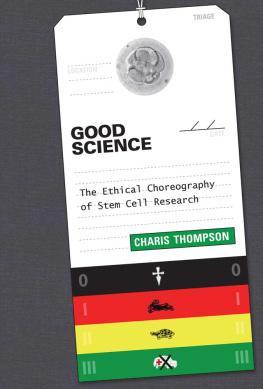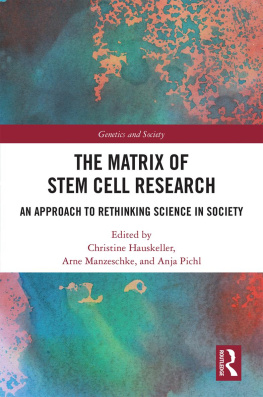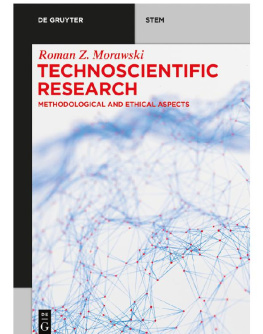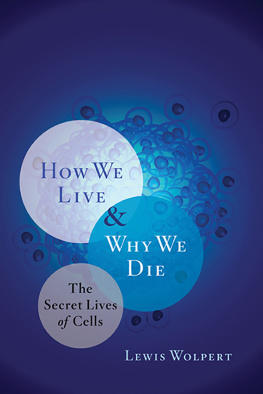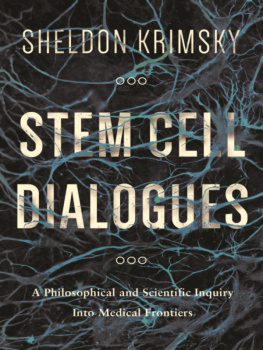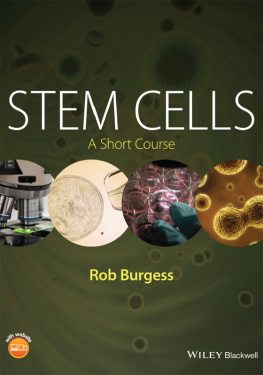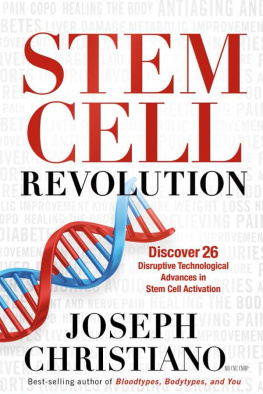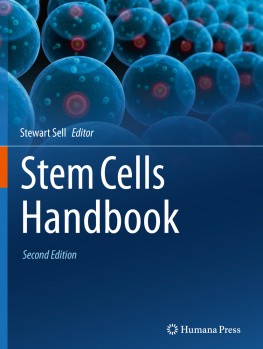Good Science
Inside Technology
edited by Wiebe E. Bijker, W. Bernard Carlson, and Trevor Pinch
Janet Abbate, Inventing the Internet
Atsushi Akera, Calculating a Natural World: Scientists, Engineers and Computers during the Rise of U.S. Cold War Research
Morana Ala, Handling Digital Brains: A Laboratory Study of Multimodal Semiotic Interaction in the Age of Computers
Stathis Arapostathis and Graeme Gooday, Patently Contestable: Electrical Technologies and Inventor Identities on Trial in Britain
Charles Bazerman, The Languages of Edisons Light
Marc Berg, Rationalizing Medical Work: Decision-Support Techniques and Medical Practices
Wiebe E. Bijker, Of Bicycles, Bakelites, and Bulbs: Toward a Theory of Sociotechnical Change
Wiebe E. Bijker and John Law, editors, Shaping Technology/Building Society: Studies in Sociotechnical Change
Wiebe E. Bijker, Roland Bal, and Ruud Hendricks, The Paradox of Scientific Authority: The Role of Scientific Advice in Democracies
Karin Bijsterveld, Mechanical Sound: Technology, Culture, and Public Problems of Noise in the Twentieth Century
Stuart S. Blume, Insight and Industry: On the Dynamics of Technological Change in Medicine
Pablo J. Boczkowski, Digitizing the News: Innovation in Online Newspapers
Geoffrey C. Bowker, Memory Practices in the Sciences
Geoffrey C. Bowker, Science on the Run: Information Management and Industrial Geophysics at Schlumberger, 19201940
Geoffrey C. Bowker and Susan Leigh Star, Sorting Things Out: Classification and Its Consequences
Louis L. Bucciarelli, Designing Engineers
Michel Callon, Pierre Lascoumes, and Yannick Barthe, Acting in an Uncertain World: An Essay on Technical Democracy
H. M. Collins, Artificial Experts: Social Knowledge and Intelligent Machines
Park Doing, Velvet Revolution at the Synchrotron: Biology, Physics, and Change in Science
Paul N. Edwards, The Closed World: Computers and the Politics of Discourse in Cold War America
Andrew Feenberg, Between Reason and Experience: Essays in Technology and Modernity
Tarleton Gillespie, Pablo J. Boczkowski, and Kirsten A. Foot, editors, Media Technologies: Paths Forward for Social Research
Michael E. Gorman, editor, Trading Zones and Interactional Expertise: Creating New Kinds of Collaboration
Herbert Gottweis, Governing Molecules: The Discursive Politics of Genetic Engineering in Europe and the United States
Joshua M. Greenberg, From Betamax to Blockbuster: Video Stores and the Invention of Movies on Video
Kristen Haring, Ham Radios Technical Culture
Gabrielle Hecht, Entangled Geographies: Empire and Technopolitics in the Global Cold War
Gabrielle Hecht, The Radiance of France: Nuclear Power and National Identity after World War II
Kathryn Henderson, On Line and On Paper: Visual Representations, Visual Culture, and Computer Graphics in Design Engineering
Christopher R. Henke, Cultivating Science, Harvesting Power: Science and Industrial Agriculture in California
Christine Hine, Systematics as Cyberscience: Computers, Change, and Continuity in Science
Anique Hommels, Unbuilding Cities: Obduracy in Urban Sociotechnical Change
Deborah G. Johnson and Jameson W. Wetmore, editors, Technology and Society: Building Our Sociotechnical Future
David Kaiser, editor, Pedagogy and the Practice of Science: Historical and Contemporary Perspectives
Peter Keating and Alberto Cambrosio, Biomedical Platforms: Reproducing the Normal and the Pathological in Late-Twentieth-Century Medicine
Eda Kranakis, Constructing a Bridge: An Exploration of Engineering Culture, Design, and Research in Nineteenth-Century France and America
Jens Lachmund, Greening Berlin: The Co-Production of Science, Politics, and Urban Nature
Christophe Lcuyer, Making Silicon Valley: Innovation and the Growth of High Tech, 19301970
Pamela E. Mack, Viewing the Earth: The Social Construction of the Landsat Satellite System
Donald MacKenzie, Inventing Accuracy: A Historical Sociology of Nuclear Missile Guidance
Donald MacKenzie, Knowing Machines: Essays on Technical Change
Donald MacKenzie, Mechanizing Proof: Computing, Risk, and Trust
Donald MacKenzie, An Engine, Not a Camera: How Financial Models Shape Markets
Cyrus C. M. Mody, Instrumental Community: Probe Microscopy and the Path to Nanotechnology
Maggie Mort, Building the Trident Network: A Study of the Enrollment of People, Knowledge, and Machines
Peter D. Norton, Fighting Traffic: The Dawn of the Motor Age in the American City
Helga Nowotny, Insatiable Curiosity: Innovation in a Fragile Future
Ruth Oldenziel and Karin Zachmann, editors, Cold War Kitchen: Americanization, Technology, and European Users
Nelly Oudshoorn and Trevor Pinch, editors, How Users Matter: The Co-Construction of Users and Technology
Shobita Parthasarathy, Building Genetic Medicine: Breast Cancer, Technology, and the Comparative Politics of Health Care
Trevor Pinch and Richard Swedberg, editors, Living in a Material World: Economic Sociology Meets Science and Technology Studies
Paul Rosen, Framing Production: Technology, Culture, and Change in the British Bicycle Industry
Richard Rottenburg, Far-Fetched Facts: A Parable of Development Aid
Susanne K. Schmidt and Raymund Werle, Coordinating Technology: Studies in the International Standardization of Telecommunications
Wesley Shrum, Joel Genuth, and Ivan Chompalov, Structures of Scientific Collaboration
Rebecca Slayton, Arguments that Count: Physics, Computing, and Missile Defense, 19492011
Chikako Takeshita, The Global Politics of the IUD: How Science Constructs Contraceptive Users and Womens Bodies
Charis Thompson, Good Science: The Ethical Choreography of Stem Cell Research
Charis Thompson, Making Parents: The Ontological Choreography of Reproductive Technology
Dominique Vinck, editor, Everyday Engineering: An Ethnography of Design and Innovation
Good Science
The Ethical Choreography of Stem Cell Research
Charis Thompson
The MIT Press
Cambridge, Massachusetts
London, England
2013 Massachusetts Institute of Technology
All rights reserved. No part of this book may be reproduced in any form by any electronic or mechanical means (including photocopying, recording, or information storage and retrieval) without permission in writing from the publisher.
Library of Congress Cataloging-in-Publication Data
Thompson, Charis.
Good science : the ethical choreography of stem cell research / Charis Thompson, Inside Technology.
p. cm.
Includes bibliographical references and index.
ISBN 978-0-262-02699-4 (hardcover : alk. paper)
ISBN 978-0-262-31904-1 (retail e-book)
1. Stem cellsResearchMoral and ethical aspectsUnited States. 2. Stem cellsResearchGovernment policyCalifornia. 3. Stem cellsResearchUnited StatesFinance. 4. Federal aid to medical researchUnited States. I. Title.
QH588.S83.T48 2013
[R853.H8]
616.02774dc23
2013024261
d_r1
Acknowledgments
I thank family, friends, colleagues, and students for their inspiring intellectual work and for their commitment to the issues of the day. I am especially fortunate to have worked with the faculty, staff, and students of the units that together make up the Gender and Womens Studies Department, the Center for Science, Technology, and Medicine in Society, and the Center for Race and Gender at UC Berkeley. I am grateful to the Deans of the Social Sciences and Humanities, the Committee on Research at UC Berkeley, and the Mellon Foundation for supporting the research upon which this book is based. I also much appreciate the support from the California Institute for Regenerative Medicine and from UC Berkeleys former Chancellor, Robert Birgeneau, and Executive Vice Chancellor, George Breslauer, for the Stem Cells and Society program.
Next page
